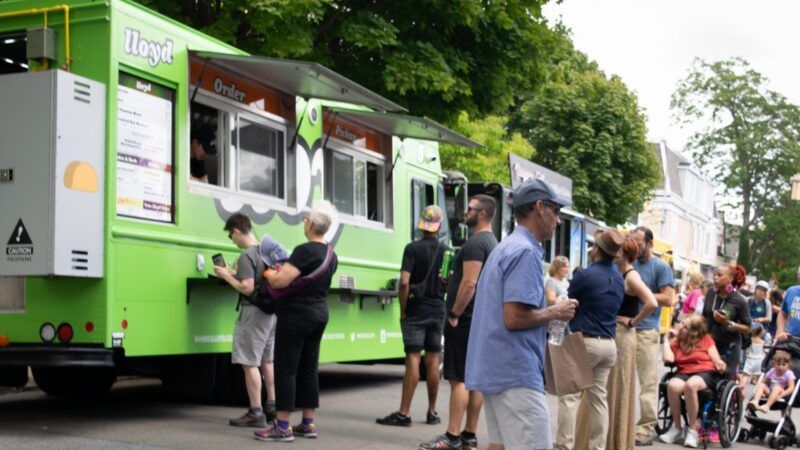Food Trucks Still Being Squeezed Out by Local Governments
Detroit leaders throw around words like "fairness" and "equity" while shielding big restaurants from smaller competition.

Last week, Detroit's city council introduced new rules that will allow food trucks to operate in more parts of the city beginning next spring.
"From an equity standpoint and from a food access standpoint, we believe food trucks should be able to operate in public spaces across the city," city councilor Raquel Castañeda-Lopez, who introduced the measure, told the Detroit Free Press. I agree.
Some advocates for downtown Detroit appear quite vaguely pleased.
"Not being against an ordinance but important to have the clarity to what can and cannot take place in the city street but supporting fairness and harmony," Eric Larson, CEO of the Downtown Detroit Partnership, told the Detroit Free Press. "We have to continue to find ways to support all of the small businesses equitably."
While words such as "fairness and harmony" and "equitably" make for a nice word salad, they mask the true, protectionist spirit underlying the new ordinance.
"Food trucks must be 200 feet away from existing restaurants and 300 feet from entertainment and sports arena areas," the Freep report indicates, also noting that food trucks may no longer operate after 11 p.m. That's progress?
Maybe to Larson, whose nebulous, we kinda sorta like it remarks aren't a huge surprise, given that Downtown Detroit Partnership's member list includes a host of giant companies and traditional food-truck opponents—including brick-and-mortar restaurateurs and the realty groups that rent space to them.
Indeed, in discussions of expanding food truck access to other parts of Detroit—or any city or town in America—the devil's in the details.
Just a couple days after the city council vote, American Coney Island, a brick-and-mortar hot dog joint in Detroit that's operated since 1917, tweeted out its displeasure at having to compete, for the time being, with a "fleet of unexpected food trucks parked along our street." Owner Grace Keros, Deadline Detroit reported, "was particularly concerned about the trucks that sell hot dogs. She said her neighbor Lafayette Coney Island was also upset." Lafayette Coney Island and American Coney Island, brick-and-mortar neighbors for more than 100 years, each sell hot dogs. (Read that sentence again.)
A host of withering comments greeted American Coney's tweet, noting the hot dog restaurant doesn't own the street, and that competition and "CHOICE" are, you know, good things.
Those commenters get it. Radius restrictions have always been about illegally protecting brick-and-mortar restaurants from competition. Nothing else.
Detroit's hardly alone. City councilors in Beatrice, Neb., south of Lincoln, are mulling how to regulate food trucks that operate in the city. Though at least one councilor lauded food trucks as "a bright spot in the community," the Lincoln Journal Star reported this week, the council appears set on making sure those bright spots don't park anywhere near a brick-and-mortar restaurant in the city.
"The ordinance would prevent mobile food vending within 50 feet of a food establishment, though Councilor Rick Clabaugh recommended changing that to 100 feet," the Journal Star report noted.
50 feet isn't enough? Why not 100 feet? Why not 300 feet? Or a mile? Or in some other city?
Nearly a year ago, I discussed the case of a brick-and-mortar restaurant owner who wanted her town, Seymour, Ind., to restrict food trucks because, she said, her restaurant "can't compete with Chick-fil-A," the national restaurant chain, which occasionally parked a food truck in town.
"What is the point of having them in downtown Seymour when we have restaurants here that are trying to grow and strive to make downtown better?" Brewskies owner Lori Keithley asked at the time.
"The point?" I wondered? "Well, it's competition and choice. But some who can't or won't compete throw up their hands and ask the government to limit choice by stifling competition. That's protectionism."
"We'd love food trucks," critics seem to be saying, "if they'd just park far, far away from any potential customers."
While the pandemic has decimated the restaurant industry, I noted last year, "rather than making life easier for brick-and-mortar restaurants—say, by lifting barriers to entry or by making it easier and less costly for restaurants to operate—many cities and towns have decided instead to make life harder for food trucks."
Food trucks are a welcome addition to any city or neighborhood. They're also—as recent examples in Bridgeport, Dearborn, and Centerville (outside Dayton) remind us—a great way for entrepreneurs to test out concepts that can grow into one or more brick-and-mortar restaurants. While consumers would be foolish to leave food trucks alone—so many of them serve really great food—lawmakers and regulators should just leave them be.


Show Comments (144)